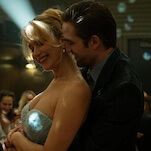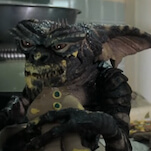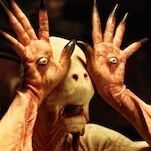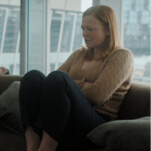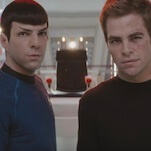Hey, it's a Lwaxana Troi episode. No, wait, come back! This one's pretty good.
Perhaps it's the human need to find connections even when none present themselves, but I've noticed lately that a lot of the double features I've been doing share thematic elements and not just the sort of elements that are common to the series as a whole. Like this week, "Half a Life" and "The Host" both deal with the difficulties of managing encounters with unfamiliar races, but what makes them interesting is the very specific impact they deal with: Namely, what happens when you fall in love with an alien? I don't mean in a Starman or a My Stepmother Is An Alien kind of way, either. These are aliens with different cultures and different biologies. On the one hand, it's a moving testament to the idea of the soul, that anyone could find and build a connection with a stranger that strange. On the other hand, you kiss a dude with a bumpy forehead, god only knows what diseases you'll wake up with in the morning.
Not that such considerations have ever stopped Lwaxana before. She's a problematic character, an irritant to the regular cast who needs to be hilarious to be at all tolerable but who rarely ever is. I've spent enough time in these reviews griping about how misjudged Troi's mother is, how she's shrill and grating when she should be boisterous, how her agonizing joie de vivre marks her as that most frustrating of all television presences: the comic relief who is neither comic nor relieving. And in a sense, she's not much different here, but it's a mark in "Half a Life"'s favor that Lwaxana's presence is so immediately acknowledged as tiresome. TNG episodes always begin with a log entry, bringing us up to speed on whatever plot elements we need to get the story going; here, all we get is Troi's simple, pained, "My mother is on board." The first scene shows Picard failing to dodge her as he makes his way to the transporter room to greet an important guest. Picard is always at a loss around Lwaxana, and Deanna doesn't do much better, but for once, these reactions are more funny than they are cringe-worthy.
What really makes "Life" work, though, is that Lwaxana spends most of her time on-screen wooing a character who seems uniquely suited to appreciating her, ah, gifts. The Enterprise is working with the people of Kaelon II to help find a way to reignite their dying sun. To this end, they've brought a Kaelonian scientist on board who thinks he has a way to solve the problem. Dr. Timicin (David Ogden Stiers) is polite, quiet, and, unsurprisingly, very driven. No one knows much about the Kaelons. We're told their isolationist policies are stringent to the point of xenophobia. But Timicin doesn't appear stand-offish or arrogant. The opposite, really; he's so unassuming at times he threatens to disappear into the sets. Stiers, whose best known from his work as Major Charles Winchester on M*A*S*H, is a decent-sized dude, but for most of the episode, he seems to be doing everything within his power to shrink into himself.
Which is maybe why he serves as such an excellent foil for Lwaxana. We've seen people shy away from her, and we've seen ridiculous villains become infatuated with her, but this is the first time we've seen her actually inspire someone in the way she intends to inspire him. (Well, first time when it wasn't a hologram, anyway.) One of the best ways to make a strident personality seem more charming is to offset them by someone who actually appreciates their clowning; while TNG has done its best in the past to make Lwaxana work by showing how everyone, deep down, thinks she's swell, Timicin's almost instantaneous awe of her is something new. It makes her seem less ridiculous. I still wouldn't want to spend any time alone with her (honestly, people who try and cheer you up by insisting you be cheerful make my teeth hurt), but at least I can believe the relationship between the two of them actually makes sense.
That's important, because for "Life" to work at all, the immediate connection between Lwaxana and Timicin has to be something we can get invested in. TNG doesn't have great luck with romantic relationships; the only real successful ones on the show seem to be the ones that aren't really entirely formed, like Troi and Riker's occasional sparring or the so-subdued-it's-practically-subliminal flirtation between Picard and Beverly. So it's a relief that even if Timicin and Lwaxana's courtship is broad and arguably rushed, it at least has a believable core. It's not perfect. Lwaxana's forcefulness is, as always, off-putting. (Just imagine if a guy tried to put these moves on a woman. Actually, you don't have to imagine it, just go watch "Galaxy's Child" again.) But Timicin is so clearly delighted by the attention that Lwaxana soon calms down into something approaching a reasonable person.
Once that happens, it becomes very clear what draws these two together: loneliness. Timicin is at a stage in his life when everything is winding down, when all his energies are committed to saving his world, without any consideration for anything beyond that. (For good reason, we'll soon see.) His wife is dead, his children are grown, and while we don't ever see his home life, it's easy to assume he's spent all his waking hours in the past few years in the lab, working towards the solution that should be the legacy he leaves to his world. Lwaxana is brash and crazy, and while the "quiet guy who gets brought to life by the nutty female" is a rank cliche, there's some truth to it. And on the flip side, well, of course Lwaxana is lonely. She's well past the prime of her life, she throws herself at anyone without the good sense to run the other way, and even her daughter is embarrassed to have her around. The show generally plays her as a free-spirit, so enamored of her self and of existence that she can't be contained, so it helps to remember the other side of all that shrill cheer: knowing that as soon as you stop having such a good time, you realize how many of the good times are behind you.
Of course, this wouldn't be much of an episode if it was just two middle-aged people jumping into bed together, so there's a catch: Kaelon II law dictates that its citizens be put to death once they reach the age of sixty. And guess who's just a few days shy of a birthday? One of the things that makes TNG such a distinctive show is its commitment to respecting the cultures it creates, and this one is no exception; Timicin explains the reasoning behind the law with enough dignity and compassion that it almost makes sense. It's essentially a way of fighting the humiliating effects of mortality on the individual and on society at large. Instead of the elderly being abandoned to die alone in "deathwatch facilities" (which sounds just a tad more ominous than "nursing home"), their faculties gone, their time of influence and vitality long behind them, the dead-at-60 law means that folks shuffle off the mortal coil surrounded by family and friends. It's called "The Resolution," and Timicin almost makes it sound noble.
Well, no, not really. Lwaxana objects stridently to the idea, and while her motives are fairly selfish (she's mostly upset that Timicin is being taken away from her), it's hard not to side with her when she points out that Kaelon II didn't really find a solution to the problem of age; they just found a way to avoid the problem. For the most part, Picard and the rest of the crew stay out of the argument. It's not till Timicin starts to have second thoughts that the captain gets involved. The doctor's attempts to rejuvenate the star fail, and Lwaxana is fairly persuasive, so Timicin gets it into his head that hey, maybe he doesn't want a lethal injection, or however Kaelon bumps off its golden oldies. (I have my fingers crossed for tiger pit w/optional ninjas.) The government of Kaelon doesn't look to highly on his decision, so out come the warships.
Again, though, Picard doesn't really do anything here. If Timicin wants to stay on the Enterprise, Picard is prepared to make that possible. We've had episodes where our heroes had to decide just how much they could interfere with a local culture without violating the Prime Directive; this is not one of those episodes. Timicin's decision becomes increasingly difficult to stand by. The people on the planet below have shut him out, refusing to acknowledge his attempts at solving the problem of the failed tests. The only person who'll talk to him is his daughter, who visits the ship to tell him how embarrassed she is of him. (Hey, it's Michelle Forbes! Who does fine here, given the script she has to work with, except her hair-do is ridiculous.) He could probably escape with the Enterprise if he really wanted to and spend the rest of his days with Lwaxana, but to what end? Even if we assume that time spent with Lwaxana would be time spent well, he'd still be abandoning everything he'd ever known and loved.
It's a tricky moral problem, and one that I'm not entirely convinced "Life" pulls off. No matter how convincing Timicin's arguments in favor of the Resolution are, they become irrelevant once he decides he maybe doesn't want to die; the strongly negative reaction from the government and from his daughter are impossible to sympathize with, because their arguments make no real sense. Partly this is a cultural thing, and the episode is laudable for trying to to honestly depict a people who sincerely believe that enforced euthanasia is noble. But it becomes too easy to hate them by the end. A daughter who is angry at her dad for not getting murdered like he's supposed to isn't a sympathetic character, even if she doesn't much care for Lwaxana. (At least the idiots in Logan's Run have the lie of "renewal" to believe in. Here, all we get is "peace" and the daughter's obsession with being buried next to Dad.)
Of course, the episode doesn't need us to believe Timicin makes a good choice in the end; we only need to believe he made the only choice he could make. There are some powerful moments in "Life," and it's pleasant for once to see Lwaxana adding, rather than subtracting, from a storyline. Her decision in the end to accompany Timicin to his suicide makes her legitimately honorable, and while that doesn't make up for all the tepid theatrics we've had to endure in the past, it at least shows that she's not a complete loss as a character. "Life"'s major flaw is that it pushes too hard to force Timicin into an untenable position, and in doing so, it turns some of its supporting players into villainous caricatures. But the episode largely redeems itself by staying true to its main point: No matter how much time you have left, it's never enough.
Grade: B+
Stray observations:
- Really, one of the reasons Lwaxana works so well here is that her edges aren't sanded down; she's still a self-centered ninny. It's just that she's a ninny who's also well-aware of her own short-comings, which makes her easier to like.
- Line That Would Sound Much Different Coming From Lex Luthor: "Alive, I am a greater threat to my world than a dying sun."
"The Host"
Or The One Where Beverly Gets Her Groove Back But Then Loses It Because This Isn't College Anymore And She's No Longer Comfortable Experimenting
So I guess Beverly decided to stop waiting for Picard, because the very first shot of this episode (after we establish that, yes, the Enterprise still exists) is her playing tongue tag with some bumpy forehead dude in a turbolift. How very gauche. Then Data interrupts Beverly and her handsome stranger, aka Ambassador Odan, who fits the "calm, taller" type that Beverly and Deanna both seem so fond of, and there's some mild comedy as Odan and Beverly try and find some way to keep Data from invading their together time. Really, having that android around is like having a 5-year-old on the ship. Somebody should really sit him down and explain the facts of life to him. Or at least the verbal cues that indicate he's being intrusive, since I'm pretty sure Tasha already helped him out with the whole birds and bees back in season one.
Like "Half a Life," "The Host" is about the challenges of interspecies courtship, and both episodes don't quite live up to the ambition of their premises. (Premisi? Man, I so wish that was a real word.) "Life" fumbles in its attempts to turn a philosophical dilemma into a real world one, while "Host" can't really make the romance at its core sing. The story requires Beverly to be so passionately invested in Odan that she's ultimately willing to follow him across bodies (though not genders), but it mostly seems like a passionate affair because we're told it's a passionate affair. Beverly goes through the expected motions of a tightly-wound woman in love, and I suppose Odan is charming enough, but the actual relationship that drives the episode is bland as every other affair on the show. Lots of throbbing music and intense close-ups, but not much in the way of actual believable emotion.
And yet, I can't really hold that too much against "The Host," because the idea here is so clever and fascinating that I don't mind it not entirely living up to what it might have been. This is just not a series that can really handle romance, for whatever reason, and really, "Host" doesn't need Odan and Beverly's love to be all that profound in order to work. This is more a problem of relationships than it is anything about specific characters. Like, remember Indecent Proposal? Yeah, the movie where Robert Redford turned Woody Harrelson into a pimp and Demi Moore into a, ahem, lady of the evening. It was a ridiculous movie, all slick visuals with no real soul or character, but the concept was so intriguing that it didn't need to be good to be successful. Everyone was just so fascinated by the moral question at the heart of the story that everything else was just gravy. Stupid, stupid gravy.
Thankfully "The Host" is quite a bit more successful, character-wise. Beverly is still Beverly, and while Odan is a little too wish-fulfillment perfect to be memorable, the actor playing him exits the episode at roughly the 10-minute mark, so that's not a huge problem. (Yes, once the symbiant is moved into Riker, Jonathan Frakes is basically playing Odan, but we still see him as Riker, with all the baggage that carries.) The actual model for the symbiant is effectively cool/gross enough looking to sell the point, and the conflict which tightens the screws on the relationship, while being yet another in a long line of "aliens who squabble" plots, is solid enough. Maybe I'm just seduced by the tech details. (There are moons and stuff!) But in a way, none of this really matters. Beverly's personality isn't really that important; apart from a brief mention of Wesley at the start of the episode, she's more here to be a stand in for the audience than because of who she is. Of course, her job as the ship's doctor is relevant, given Odan's specific health requirements, but… well, as with Geordi in "Identity Crisis," while it's hard to imagine anyone else pulling the duty Bev does here, this is more something that happens to her, than something she instigates.
Which brings us back to the Indecent Proposal angle. Nobody's offering anybody money to sleep with the good doctor (although just imagining the expression on Picard's face if somebody made the offer is enough to get me through a lot of bad mornings), but we are presented with the sort of philosophical problem that's fascinating to contemplate in the abstract. Odan is a Trill, which means that oh-so-attractively non-threatening body he's wearing at the start of the episode isn't really "him" at all, but a host that the real Odan wears until its no longer viable. The real Odan is a freaky purple and brown thing that looks like a cross between a slug and a bigger, freakier slug, and it/he/whatever has been jumping from host to host for a long time now. This isn't a negative process; the creature isn't leaching off of anyone or taking over bodies without permission. If that were the case, it would be much easier to dismiss. Instead, we simply have a different form of life than what we're accustomed to, and when Odan's host body is killed in a shuttle attack, Beverly is forced to come face to, er, something with her form-jumping suitor.
This raises some interesting questions about the nature of love, about what it is that pulls us to someone. Is it purely physical? Purely spiritual? Or is it some combination of the two that makes it difficult to accept a new face and a new body, even if the personality is unchanged. I rather think that last is true, and it's not hard at all to sympathize with Beverly's distress here. "Host" is a tad melodramatic, of course. Beverly's only known Odan two weeks when he "dies," and the amount of angst she goes through on realizing his true nature is a little much at times, even if it is entirely understandable. We need strong pressures to drive her back into the new Odan's arms, but this could've been underplayed a bit more to help balance out the strangeness of the situation. Beverly comes off as weirdly unstable, as though her lack of romance has made her nearly as lonely as poor Lwaxana. It's not that she wouldn't be upset, or troubled, or confused, but… well, it was two weeks. Falling like crazy for someone in two weeks happens all the time, but if something interrupts the fall, it's usually not that difficult to walk away.
Odan doesn't really make a great case for himself, either. While Beverly's freaking out, he spends too much time acting baffled as to why she'd be uncomfortable around him. Like just about every lover on this show (seriously, do people in the future ever just meet and decide, "Hey, let's hang out again some time"? Is it always a case of one side or the other forcing their attentions?), Odan seems to have difficulty understanding the concept of "personal space," just barely managing to restrain himself from grabbing Beverly in his arms post-transformation and forcing her to see reason via lip assault. She does eventually succumb, at least in part because after Odan's original host dies, Riker volunteers to temporarily support the Trill until a new host can arrive. While there's never been any implication on the show that Bev is into Riker (or the reverse, although seeing as how this is Riker, I doubt he hasn't considered it), he's at least a familiar face and someone she trusts. Admittedly, the fact that she knows Riker so well makes the alienness of Odan's condition even more apparent, but there's a friendship there already. Only I think the host bodies experience/remember everything that happens to them, so there was probably some awkward eye contact after Odan left.
As always with new races on TNG, I can't help wondering at just how the Trill society works. Are the host bodies from another species? Why would someone willingly give up control of themselves to another creature? And how is it that nobody at Starfleet as any idea how any of this works? None of this really stretches credibility, and I appreciate that it isn't over-explained, but given that, so far as we can tell, Odan's control over the body he inhabits is a dictatorship rather than a democracy, it's the sort of connection that could use a little more justification. (Since the Trill don't exactly disappear from the Trek franchise after this episode, I imagine we'll get more explanation down the road.) Really, though, the details aren't the important part here, as much as I enjoy them. The important bit is trying to decide if you could love someone even if they stopped looking like themselves.
Beverly decides she can, but only to a certain point. I made the joke last week that "The Host" compromises at the end in the face of potential controversy, but I did the episode a disservice. After a long struggle to keep Riker alive long enough for Odan to get his job done, Odan's new host body arrives, and it's female. While this She-Odan still has the same feelings for Bev that Riker-Odan did, Beverly isn't able to make the gender jump and sadly ends their relationship in the episode's final scene. This makes perfect sense. We like to pretend that love is a wholly spiritual thing, but that does the sensation a disservice; we fall in love with features, with shapes, with bodies, as well as with minds. And, more crucially, when we fall in love, we admit that we're willing to sacrifice a piece of ourselves in order to get closer to someone else. But everyone has a line, and if you love them, you won't ask them to cross it.
Grade: B+
Stray Observations:
- "Listening with skill seems to have evaporated with the heat of argument." President Obama should totally have quoted this in his State of the Union speech.
- Beverly turns to Troi for comfort in her distress, and Troi, well, she tells Beverly to go get with Odan in Riker form, because Troi's in love with her dead father? Or something. A very odd scene. It's supposed to be about the importance of love and so forth, but it really just plays as poor Troi having some serious Daddy issues.
- Odan's behavior post-body swap is fairly hideous, although I think we're supposed to take it as "forceful" or "romantic." You didn't tell a woman you love that you were really a sentient slug body-jumping its way through life, dude. You can't pretend that she's the unreasonable one here.
Next week: We check out "The Mind's Eye" and "In Theory."











